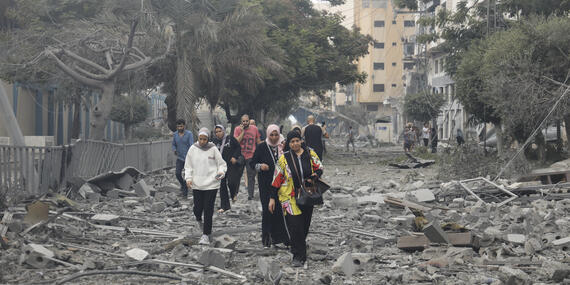Today's top news: Israel/Occupied Palestinian Territory, Ukraine

Israel/Occupied Palestinian Territory
The Emergency Relief Coordinator, Martin Griffiths, was in Jerusalem yesterday and met with Israeli President Isaac Herzog and families of hostages.
In a social media post yesterday, Mr. Griffiths said he could not imagine what the families are going through, living in agony for the past three weeks, not knowing if their loved ones are dead or alive.
Today, Mr. Griffiths met Palestinian Prime Minister Mohammad Shtayyeh in Ramallah. He also talked to families in Gaza and said that what they have endured since 7 October is beyond devastating, adding that misery is growing by the minute. After talking to an eight-year-old who told him she does not want to die, Mr. Griffiths said it is hard not to feel helpless.
In a briefing to the Security Council yesterday, Lisa Doughten, OCHA’s Chief of Humanitarian Financing and Resource Mobilization Division, expressed concern at allegations of military installations in the close vicinity of hospitals and the request by Israeli authorities for hospitals, including Al Quds and Shifa, to be evacuated.
Speaking on Mr. Griffiths’ behalf, she said the scale of the horror people are experiencing in Gaza is hard to convey. People are becoming increasingly desperate as they search for food, water and shelter amid the relentless bombing campaign that is wiping out whole families and entire neighbourhoods.
Ms. Doughten said the provision of humanitarian relief is extremely complex and challenging due to the bombardment, the destruction of infrastructure and the lack of fuel.
OCHA reported that yesterday, 26 trucks carrying water, food and medical supplies entered Gaza through the Rafah crossing with Egypt. Since 21 October, 143 trucks with humanitarian aid have entered Gaza as of yesterday evening.
The water supply from Israel to southern Gaza came to a halt yesterday for unknown reasons, while the announced repair of another pipeline from Israel to the Middle Area, ahead of its reactivation, did not take place. This follows several days of the gradual improvement of the water supply in central and southern Gaza following the distribution of limited amounts of fuel available in Gaza to key water facilities, enabling their reactivation.
Ukraine
This morning, Ramesh Rajasingham, OCHA’s Director of Coordination, briefed at a Security Council open meeting on Ukraine.
Speaking on behalf of the Under-Secretary-General for Humanitarian Affairs, Martin Griffiths, Mr. Rajasingham said that the conflict in Ukraine continues to inflict unimaginable levels of suffering, with countrywide air strikes, artillery fire and ground fighting taking place on a daily basis.
He noted that significant damage and destruction of critical infrastructure continues to severely impact civilians’ access to electricity, heating, water and telecommunications, adding this is a particular concern as winter fast approaches and temperatures start to drop towards minus 20˚C.
Mr. Rajasingham said the operating environment has become more dangerous for humanitarian organizations as well, with the number of aid workers killed having more than tripled from four in 2022 to 14 so far in 2023.
He said that despite the risks, more than 500 humanitarian organizations – the majority of which are local organizations – reached 9 million people with life-saving aid in the first nine months of this year.
